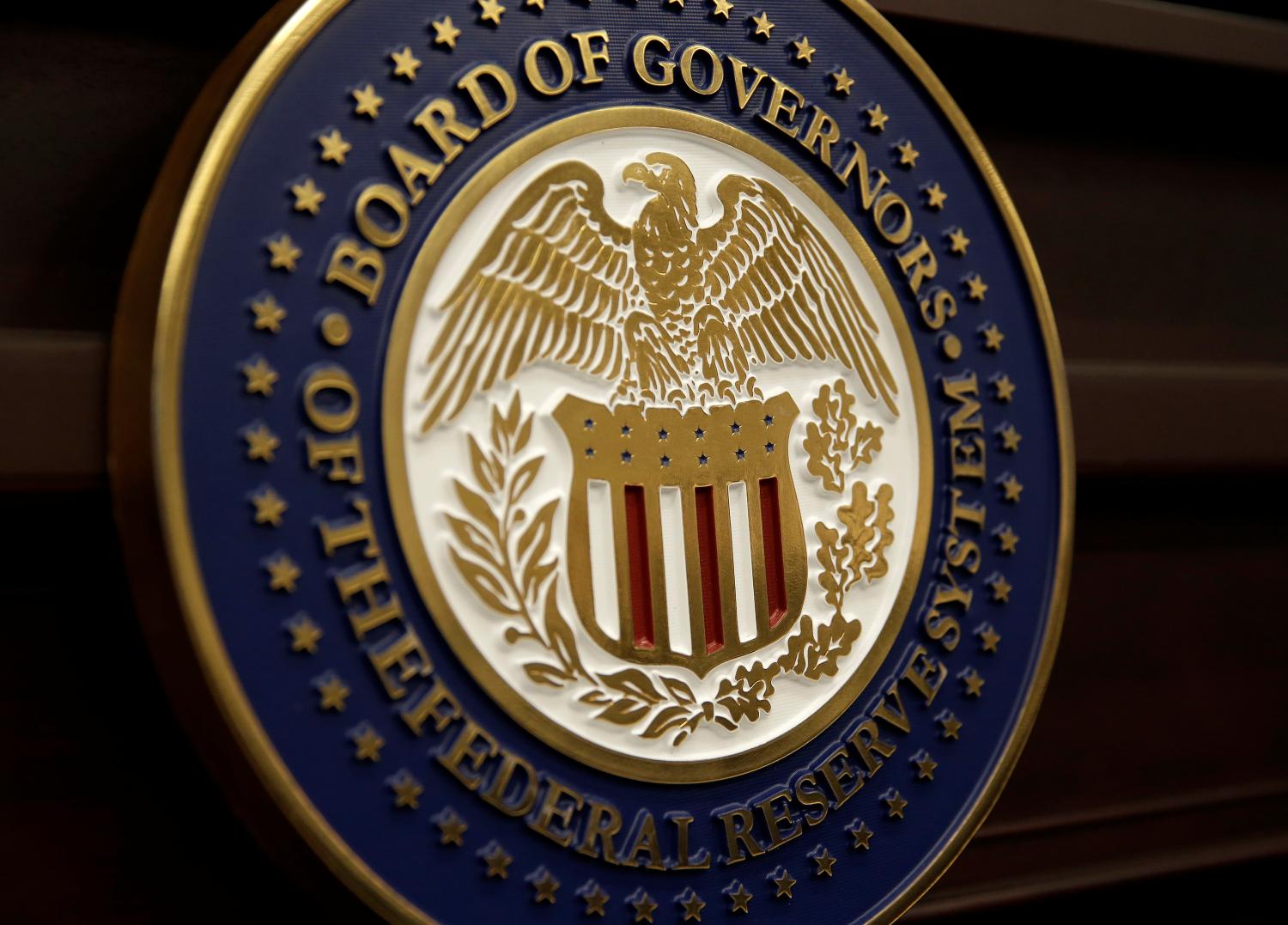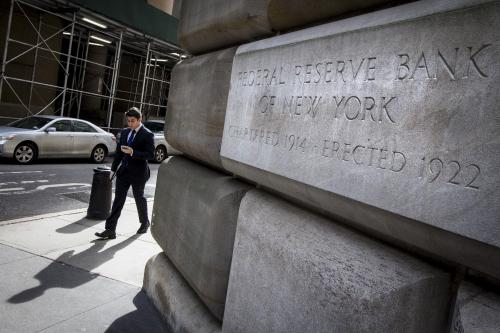This report is part of the Series on Financial Markets and Regulation and was produced by the Brookings Center on Regulation and Markets.
The Federal Reserve has recently used a once-obscure policy lever to thwart two efforts at financial innovation. In one case, a new credit union hoped to serve marijuana-related businesses; in the second, an entrepreneur wanted to open a bank that would pass along to customers the higher interest rates the Fed pays to banks. The Fed doesn’t like either business model. But does it have the legal authority to stop them?
The short answer is no. The longer answer requires some more understanding of the somewhat convoluted banking system we have in the United States.
How a new financial institution is approved
If an entrepreneur wants to form a regular corporation, the path is pretty costless. For a small fee and a few minutes online, you can create a corporation and engage in just about any kind of business activity. But to create a banking corporation, the process is much more complex. Both the states and the federal government can grant these banking charters, and they will subject would-be bankers to a much more laborious, searching inquiry than any other kind of business.
After receiving the charter, the bank isn’t done yet. Any financial institution that takes deposits must also be eligible to receive insurance from the Federal Deposit Insurance Corporation (or, if a credit union, the National Credit Union Administration). And once a financial institution opens its doors, the real business of regulation and supervision begins, with both state and a mélange of federal banking authorities aiming to ensure that the bank is well run.
There’s a good reason for this extra attention on banks. In good times, private banks participate in monetary policy, perform an essential role in facilitating payments throughout the world, and provide other services that make them different from, say, an incorporated restaurant. But when things go south, a failed bank can wreak havoc on the entire financial system and the broader economy. Hence the justification for all the extra regulatory scrutiny at all stages of the process.
In this description, I skipped a vital but (formerly) routine step. To open, a new financial institution must secure a “master account” at one of the 12 regional Federal Reserve Banks. The master account allows a financial institution to participate in the payment system. Without it, a financial institution can’t really function as a financial institution. It becomes instead a kind of storage locker.
What [the Fed] should not and cannot do is resort to pulling levers that Congress has not given it in the first place.
Fourth Corner Credit Union
The Fed no longer sees this step as routine. After the state of Colorado voted by referendum to legalize cannabis use, a group of people saw an opportunity to provide financial services to a new industry. To meet that need, they founded a credit union to accomplish those tasks, Fourth Corner Credit Union. It received a state charter and proceeded with applications for deposit insurance and a master account.
After an inordinately long delay, the Federal Reserve Bank of Kansas City rejected the application, arguing that Coloradans’ authorization of cannabis use was the same “as if Colorado enacted a scheme to allow trade in endangered species or trade with North Korea.” In other words, trade in and consumption of marijuana was still forbidden by U.S. law; how could the Fed support banking in illegal activity? The U.S. Court of Appeals for the Tenth Circuit agreed—sort of. Three judges wrote three different opinions, which resulted in the court affirming the Fed’s rejection of Fourth Corner’s application (but leaving open the possibility for Fourth Corner to try again). A few months later, Fourth Corner committed to back only ancillary businesses to cannabis dispensaries, such as advocates, accountants, and landlords, rather than the dispensaries themselves. The Kansas City Fed then provided the master account.
There is a good policy argument here that, because Congress has not changed the law on marijuana that the Fed had no other choice but to reject this application.
But the Fed reached a legal conclusion, not a policy one, and the statute isn’t at all clear that they have the authority to reject Fourth Corner’s application. In 1980, Congress passed a law that required the Fed to put a price on the essential services that the Fed provides to all financial institutions. Here is the key language:
All Federal Reserve bank services covered by the fee schedule shall be available to nonmember depository institutions and such services shall be priced at the same fee schedule applicable to member banks . . . .
As one judge wrote in reviewing the Fourth Corner case, that language is key: All of these services “shall be available to nonmember depository institutions.” The statute appears to eliminate the Fed’s discretion entirely.
That elimination doesn’t mean that banks can be lawless. As mentioned above, banks are heavily regulated and supervised, from well before they are formed. Perhaps there are limits when federal and state law conflict, as in the case of marijuana banking, but those limits do not arise from the Fed’s ability to provide a master account. Indeed, there are more than 360 banks providing banking services to marijuana-related businesses already, and not in secret. The Fed has other ways of regulating and supervising these kinds of activities, but the 1980 legislation took the central bank out of the business of second guessing the chartering authority’s original assessments about whether a financial institution can open its doors.
The Narrow Bank
Now consider the Fed’s second invocation of this (lack of) authority. James McAndrews, who worked within the Federal Reserve System for nearly 30 years, co-founded a new institution, The Narrow Bank (TNB). The business model is simple. In 2008, the Fed began paying interest to banks on the excess reserves these banks kept at their regional Federal Reserve Bank. These interest payments aren’t small: interest rates are currently at 2.20 percent. The average interest rate at savings accounts pays depositors just 0.09 percent.
TNB wants to make money on that spread: the bank wants to take deposits, park that money at its regional Federal Reserve Bank (and thus receive the 2.20 percent), take a fee, and pay out a higher rate than these depositors get elsewhere.
The state of Connecticut put McAndrews and his co-founders through their paces to secure their charter, subject to their receiving this master account. But the Fed denied the application, citing unnamed “policy reasons.”
What’s striking about the Fed’s denial is that TNB stands for the opposite of the traditional fragile banking model that normally justifies so much of bank regulation. It’s a “narrow banking” model that would back its deposits with 100 percent reserves, located at what is deemed by nearly everyone as the safest of safe locations —the U.S. central bank.
TNB has sued. And TNB should win.
Conclusion
The Fed is welcome, under law, to issue rules explaining when they can or can’t use this policy lever. But those rules must conform to the laws passed by Congress.
The Fed is not a chartering authority and should not contort itself to become one. The kinds of existential banking concerns that the Fed makes about Fourth Corner and TNB are for chartering authorities to evaluate. Connecticut and Colorado have already done this work.
If the Fed doesn’t trust that a credit union will really follow federal law or doesn’t like the arbitrage opportunity that its monetary policy invites, it has options: it can rethink the way it supervises financial institutions or it can change its monetary policy framework. What it should not and cannot do is resort to pulling levers that Congress has not given it in the first place.
The author did not receive financial support from any firm or person for this article or from any firm or person with a financial or political interest in this article. He is currently not an officer, director, or board member of any organization with an interest in this article.
The Brookings Institution is committed to quality, independence, and impact.
We are supported by a diverse array of funders. In line with our values and policies, each Brookings publication represents the sole views of its author(s).






